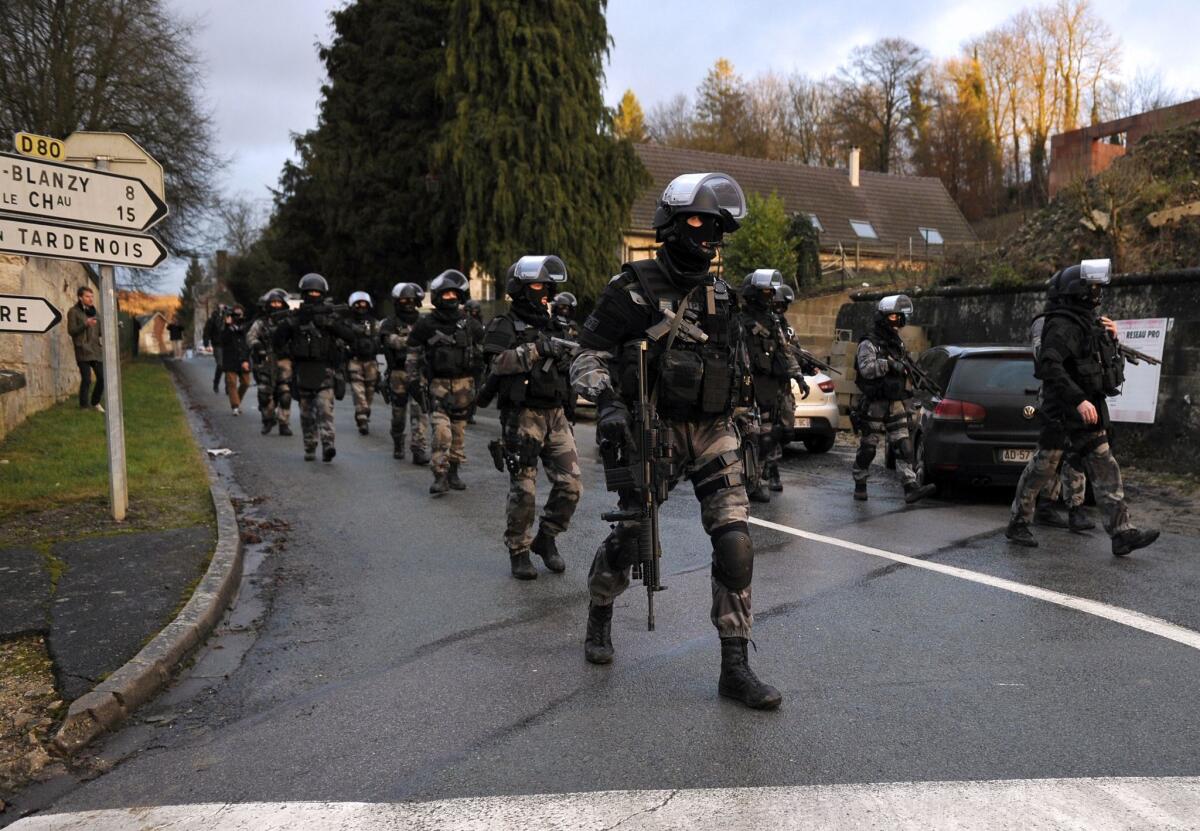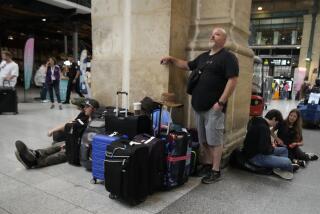Charlie Hebdo attack suspects remain on the run

Reporting from Paris — France mourned its dead Thursday amid a national sense of alarm as law enforcement authorities using a massive dragnet searched for two brothers suspected in the massacre of a dozen people at a Paris magazine.
As of early Friday, the two men had eluded a police hunt focused on several northern French towns where the fugitives were reportedly seen robbing a gas station and looking for a hide-out. Images on French television showed masked anti-terrorism police in helmets and full riot gear searching semirural homes as a helicopter hovered overhead.
LIVE UPDATES: Charlie Hebdo plans to print next week; 2 suspects on loose
Adding to the unease was news of another killing — this time a policewoman in a south Paris neighborhood. A gunman shot her dead during a traffic incident and fled, authorities said. It was unclear whether the shooting was linked to Wednesday’s killings at the offices of the satirical weekly magazine Charlie Hebdo.
Meanwhile, authorities reported two attacks on mosques that officials feared could set off a wave of retributory strikes in the country with Europe’s largest Muslim community.
A day of national mourning was observed for the victims of the deadliest attack on home soil in decades. The vibrant heart of the French capital stilled as transportation halted, church bells fell silent and crowds gathered under gray clouds and a steady drizzle that matched the somber mood of a stunned nation.
In the evening, mourners crowded anew into the Place de la Republique in central Paris to remember the dead, occasionally breaking into chants of “Charlie n’est pas mort!” (Charlie is not dead!) and impromptu versions of “The Marseillaise,” the national anthem.
As thousands of people attended memorials, authorities hunted the brothers identified as the masked, black-clad suspects wielding assault rifles in Wednesday’s attack who systematically shot a dozen people dead. The victims were eight journalists, including the magazine’s chief editor, Stephane Charbonnier, two police officers, a maintenance worker and a visitor.
Police sought French citizens Said Kouachi, 34, and his brother Cherif, 32, in connection with the slayings.
U.S. intelligence officials believe Said Kouachi trained in Yemen for a few months in 2011 with Al Qaeda in the Arabian Peninsula, Al Qaeda’s franchise organization there, according to a U.S. counter-terrorism official.
Indications are that the elder Kouachi returned to France that same year, shortly before Anwar Awlaki, the American-born cleric who directed the group’s outreach to Europeans and Americans, was killed by a U.S. airstrike. U.S. intelligence officials believe Kouachi may have lost contact with his handler in the Al Qaeda franchise after Awlaki was killed in September 2011.
Awlaki’s death may have disrupted plans for Kouachi to launch an attack earlier and could explain why Kouachi kept a low profile for several years before the deadly assault in Paris, the official said. The official spoke on condition of anonymity in discussing internal assessments.
Cherif Kouachi was arrested in 2005 by French authorities and convicted in a French court in 2008 of trying to help smuggle fighters to Iraq. The brothers were linked to a plot in 2010 to free an Algerian militant from jail but neither one was prosecuted in the case, the official said.
Based on information provided by French authorities, the two men were listed on the U.S. terrorism watch list, the Terrorist Identities Datamart Environment database maintained by the U.S. National Counterterrorism Center, the official said, and probably would have been prevented from boarding a flight to the United States, the official said.
French media reported Thursday that Cherif Kouachi was a failed rap musician who was featured in a 2005 television documentary on aspiring rappers, before drifting into crime.
While in prison, he befriended Djamel Beghal, who was serving a 10-year sentence for a plot to instigate an attack on the U.S. Embassy in Paris in 2001, according to Le Monde newspaper.
Authorities suspect that Wednesday’s killings may have been an act of Islamic terrorism against a magazine known for its caricatures of public and historical figures, including the prophet Muhammad. Muslim leaders in France have condemned the killings.
Prime Minister Manuel Valls told France’s RTL radio that there had been several detentions overnight in connection with the manhunt for the brothers. Their relationship to the brothers was not specified.
It remained unclear whether Wednesday’s attack, widely described as methodical and cold-blooded, was linked to any outside terrorist network.
A witness account in the French press quoted one of the attackers as saying, “You can tell the media that it’s Al Qaeda in Yemen.” But there was no official confirmation that the incident was connected to Al Qaeda or any other foreign group.
Early Thursday, two men matching the brothers’ description reportedly robbed a gas station in Villers-Cotterets, prompting a swarm of police and helicopters to descend on the small town 44 miles north of Paris. Special police units also searched nearby Crepy-en-Valois after reports surfaced that the suspects had taken refuge there after fleeing the gas station in a Renault Clio and heading in the direction of Paris.
In the south Paris district of Montrouge, the female police officer was shot to death while investigating a car accident.
Elsewhere in France, gun and grenade attacks were reported outside mosques in Le Mans, southwest of Paris, and in Villefranche-sur-Saone, near Lyon, raising fears of an anti-Muslim backlash. No one was injured in either incident, police said. Authorities urged calm.
Meanwhile, in an act of defiance by the target of Wednesday’s slayings, Charlie Hebdo intends to publish 1 million copies of its Jan. 14 issue, or 17 times its normal press run, the magazine’s attorney, Richard Malka, told France Info radio.
Across Paris, mourners gathered to honor those killed. Thick gray clouds hung low in the sky.
“Whoever did this wanted to shut the mouth of free expression,” said Margy Adjouhgniope, 21, a university student who with her sister visited a makeshift shrine at the Place de la Republique.
The plaza, with its signature monument to liberty, fraternity and equality, has become a collective mourning ground. Handwritten signs in a multitude of languages proclaim: “I am Charlie.”
People added pens, pencils and scribbled notes to the mounds of flowers and candles, in a nod to the slain journalists’ craft. One person wrote: “Don’t kill anyone in the name of my religion.”
Another anonymous placard declared: “It is ink that should flow, not blood.”
At noon Thursday, during a moment of silence for the victims, those gathered in the plaza held hands as they circled the monument. Some had tears in their eyes. The observance silenced church bells, halted transit and darkened the Eiffel Tower.
“It was a very moving, solemn moment. It was about freedom of speech and how critical it is that voices be heard,” said Thomas Rutledge, an American chemistry professor visiting Paris.
Hundreds gathered in front of the Notre Dame Cathedral, where the somber crowd fell quiet after bells tolled at the start of the remembrance, then broke into spontaneous applause as the 60 seconds ended.
Bishop Jerome Beau presided over a short Mass in the cathedral, telling the congregation that “violence just breeds violence.”
Outside the National Assembly, people huddled together under umbrellas. President Francois Hollande stood on the steps in the courtyard, facing rows of police officers standing at attention.
Lawyer Thomas Elm stood silently in front of the building. His office was nearby, and despite the dreary, wet day that only added to the sense of melancholy that had settled over the city, he did not want to be alone at this poignant moment, he said.
“The French like to argue and fight, and debate our differences in politics and religion. And sometimes we do it very loudly,” he said. “But at a moment like this, we put that aside and have an ability to present a unique, unified front.
“I want to be out here in front of the assembly because it’s a symbol of our republic and our freedom and democracy.”
One man stood through the moment with his fist held high in the air.
The Metro halted service for a full minute, and across the city, some newsstands put up black posters with #JeSuisCharlie to show solidarity with the slain journalists. The hashtag started trending on Twitter soon after the assault. It was chanted at many of the spontaneous vigils that took place across the country and those present also symbolically held pens in the air.
The hashtag #MouradHamydInnocent also started to trend on Twitter in France, believed to have been started by classmates of the third man named in connection with the attack.
Hamyd Mourad, 18, reportedly turned himself in to French authorities late Wednesday after learning he was being sought as a suspect. His possible connection to the case was unclear.
Times staff writer McDonnell and special correspondent Boyle reported from Paris and staff writer Bennett from Washington. Staff writers David S. Cloud and W.J. Hennigan in Washington and special correspondent Chris O’Brien in Paris contributed to this report.
More to Read
Sign up for Essential California
The most important California stories and recommendations in your inbox every morning.
You may occasionally receive promotional content from the Los Angeles Times.











